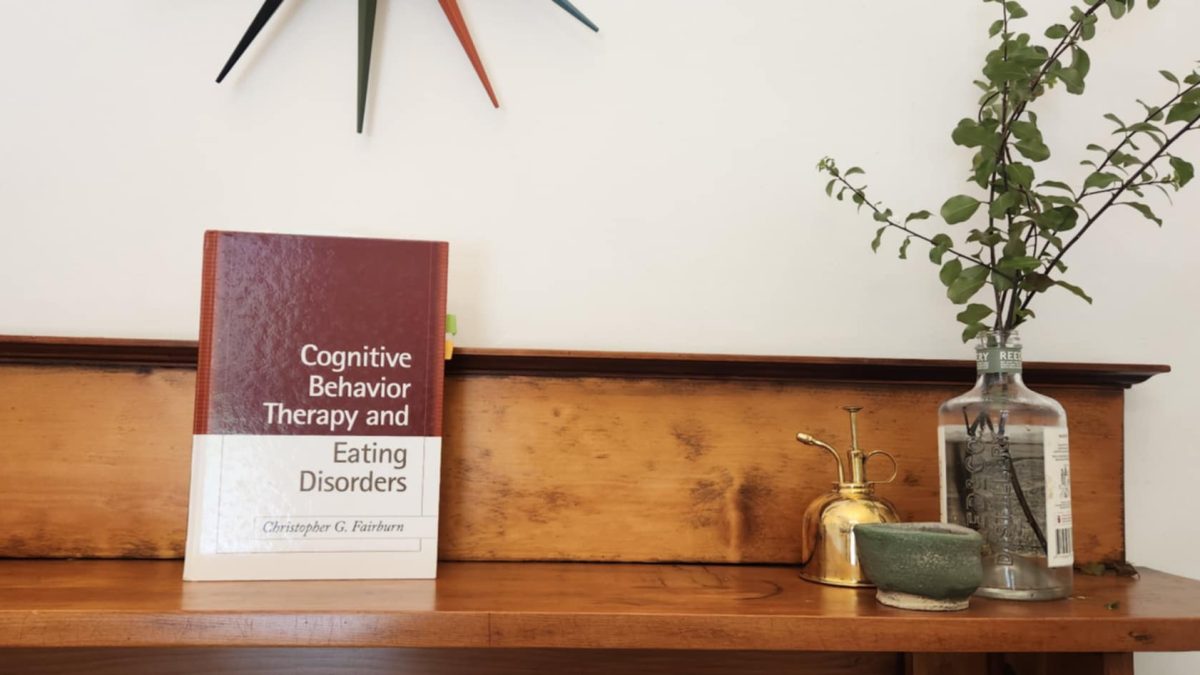
Feeling Pressured to Take Ozempic?
March 9, 2025
Tips for Eating When You Just Don’t feel Like Eating
June 6, 2025Struggling with food and your body? How CBT-E Can Help.

CBT-E is a powerful tool in the journey toward healing from eating disorders and improving body image.
If you’ve ever found yourself knee-deep in an empty chips bag at midnight, eating food from your rubbish bin in secret, battling food guilt, or stuck in a cycle of bingeing and restricting, you know how exhausting it can be. And despite what diet culture might tell you, this isn’t about willpower. There are deeper reasons why these patterns keep showing up, and that’s where Cognitive Behavioural Therapy for Eating Disorders (CBT-E) comes in.
CBT-E is an evidence-based, gold-standard treatment for binge eating, anorexia, bulimia, OSFED, and other disordered eating habits. It’s designed to help you quiet the food noise, stop the late-night cravings, and feel better in your body, without another restrictive diet or punishing workout plan. Imagine waking up and not immediately stressing over what you ate yesterday or what you’re “allowed” to eat today. Picture eating a meal and actually enjoying it, without a voice in your head telling you that you’re doing it wrong, and still feeling good in your body. That’s what food freedom looks like.
Why Do We Binge Eat?
Ever had one of those nights where you swear you’re going to “be good,” but by 10pm, you’re knee-deep in snacks you didn’t even want? That’s not just a lack of willpower; it’s your body rebelling against restriction. CBT-E helps break this cycle by:
- Making sure you’re eating enough throughout the day so you’re not constantly battling hunger.
- Helping you understand your emotional triggers for binge eating and giving you better ways to cope.
- Challenging the guilt that comes after a binge, so you don’t spiral into self-punishment.
- Ditching the all-or-nothing thinking—because one “bad” meal doesn’t ruin anything.
- Teaching you how to feel more neutral about food so it doesn’t hold so much power over you.
Struggling with Anorexia or Restriction?
Maybe your struggle isn’t binge eating, but rather feeling anxious about certain foods, constantly thinking about what’s “safe” to eat, or avoiding social events because of food fears. Maybe you feel like you have to be in control all the time, even at the expense of your own well-being. CBT-E can help by:
- Making food feel less scary by gradually introducing flexibility into your meals.
- Challenging perfectionist thinking and rigid food rules that make eating stressful.
- Working on the deeper fears about weight gain or food control that might be keeping you stuck.
- Addressing body image concerns step by step, so you can feel more comfortable in your skin.
- Helping you recognize when restriction is actually making life harder, not easier.
Bulimia, OSFED, and Diet Culture’s Influence
If you find yourself stuck in a cycle of bingeing and purging or struggling with a pattern that doesn’t fit into a neat diagnostic box (OSFED), you are not alone. Diet culture teaches us that thinness equals worthiness, and it often leads to extreme behaviors around food. CBT-E helps by:
- Breaking the binge-purge cycle and addressing the emotions that drive it.
- Teaching you to trust your body’s hunger and fullness cues, so food doesn’t feel like an enemy.
- Helping you move away from dieting and toward a way of eating that feels balanced and sustainable.
- Challenging the harmful messages about weight and food that diet culture has ingrained in us.
- Supporting you in finding self-worth beyond the number on the scale.
No Quick Fixes (unfortunately, I wish there were!)
Let’s be real: if there were a magic cure, you would have found it by now. In a world where we expect instant results (because, let’s face it, waiting even a minute for a TikTok to load feels unbearable), it’s hard to accept that real change takes time.
But here’s the thing: CBT-E is designed for long-term, meaningful change. It’s not about forcing yourself to eat a certain way. Instead, it helps you understand your unique relationship with food and shift it in a way that actually lasts. Over time, you’ll learn to trust your body, challenge negative thoughts, and let go of the exhausting cycle of restriction, bingeing, and body shame.
Ready to Break Free?
You don’t have to do this alone. As a clinical psychologist specializing in eating disorders, I help people break free from binge eating, restrictive eating, and food anxiety. If any of this sounds familiar, let’s chat. Recovery is possible, and you deserve to feel at peace with food and your body.



